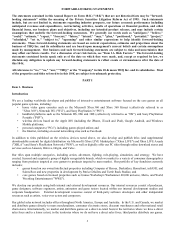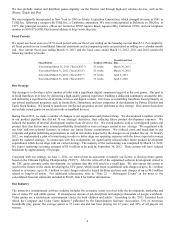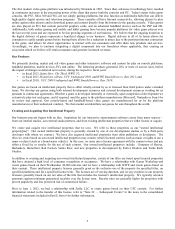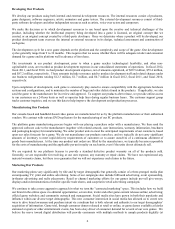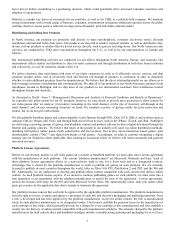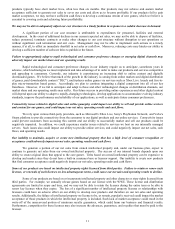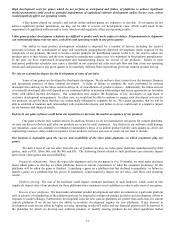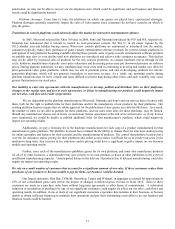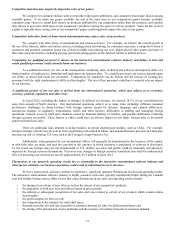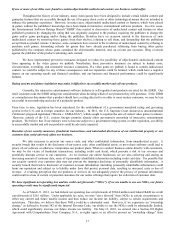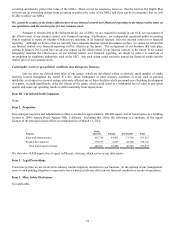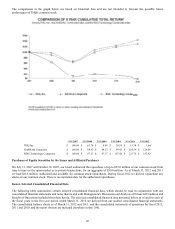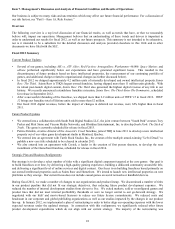THQ 2012 Annual Report Download - page 21
Download and view the complete annual report
Please find page 21 of the 2012 THQ annual report below. You can navigate through the pages in the report by either clicking on the pages listed below, or by using the keyword search tool below to find specific information within the annual report.13
penetration, we may not be able to recover our development costs, which could be significant, and our business and financial
results could be significantly harmed.
Platform shortages. From time to time, the platforms on which our games are played have experienced shortages.
Platform shortages generally negatively impact the sales of video games since consumers do not have consoles on which to
play the games.
Transitions in console platforms could adversely affect the market for interactive entertainment software.
In 2005, Microsoft released the Xbox 360 and, in 2006, Sony and Nintendo introduced the PS3 and Wii, respectively.
Nintendo has announced that it intends to launch its next-generation console, the Wii U, in all major regions by the
2012 calendar year-end holiday buying season. When new console platforms are announced or introduced into the market,
consumers typically reduce their purchases of game console entertainment software products for current console platforms in
anticipation of new platforms becoming available. During these periods, sales of game console entertainment software products
we publish may slow or even decline until new platforms are introduced and achieve wide consumer acceptance. This decline
may not be offset by increased sales of products for the new console platforms. As console hardware moves through its life
cycle, hardware manufacturers typically enact price reductions and decreasing prices may put downward pressure on software
prices. During platform transitions, we may simultaneously incur costs both in continuing to develop and market new titles for
prior-generation video game platforms, which may not sell at premium prices, and also in developing products for current-
generation platforms, which will not generate immediate or near-term revenue. As a result, our operating results during
platform transitions may be more volatile and more difficult to predict than during other times, and such volatility may cause
greater fluctuations in our stock price.
Our inability to enter into agreements with the manufacturers to develop, publish and distribute titles on their platforms,
changes to the royalty rates and fees in such agreements, or delays in manufacturing our products could negatively impact
our net sales, cash flow and results of operations.
We are dependent on the platform manufacturers (Microsoft, Nintendo and Sony) and our non-exclusive licenses with
them, both for the right to publish titles for their platforms and for the manufacture of our products for their platforms. Our
existing platform licenses require that we obtain approval for the publication of new games on a title-by-title basis. As a result,
the number of titles we are able to publish for these platforms, and our sales from titles for these platforms, may be limited.
Should any manufacturer choose not to renew or extend our license agreement at the end of its current term, or if any license
were terminated, we would be unable to publish additional titles for that manufacturer's platform, which could negatively
impact our operating results.
Additionally, we pay a licensing fee to the hardware manufacturers for each copy of a product manufactured for that
manufacturer's game platform. The platform licensors have retained the flexibility to change their fee structures and/or pricing
for online gameplay and features for their consoles and the manufacturing of products. The control that platform licensors have
over the fee structures and/or pricing for their platforms and online access makes it difficult for us to predict our costs in the
medium-to-long term. Any increase in fee structures and/or pricing could have a significant negative impact on our business
models and operating results.
Further, since each of the manufacturers publishes games for its own platform, and some also manufacture products
for all of its other licensees, a manufacturer may give priority to its own products or those of other publishers in the event of
insufficient manufacturing capacity. Unanticipated delays in the delivery of products due to delayed manufacturing could also
negatively impact our operating results.
We rely on a small number of customers that account for a significant amount of our sales. If these customers reduce their
purchases of our products or become unable to pay for them, our business could be harmed.
Our largest customers, Best Buy, COKeM, GameStop, Target, and Walmart, in aggregate accounted for approximately
43% of our consolidated gross sales before the impact of changes in deferred gross revenue in fiscal 2012. Sales to these
customers are made on a purchase order basis without long-term agreements or other forms of commitments. A substantial
reduction or termination of purchases by any of our significant customers could negatively affect our net sales, cash flows and
operating results. In addition, if one or more of our significant customers experience deterioration in their business, or become
unable to obtain sufficient financing to maintain their operations and pay their outstanding receivables to us, our business and
financial results could be harmed.


